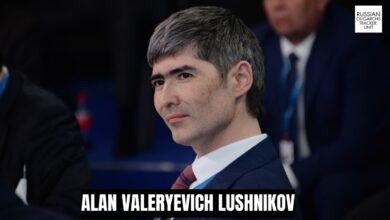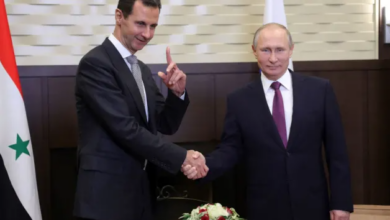David Jewberg : Fake Pentagon Analyst Identity of Dan Rapoport
Summary
- David Jewberg, a widely recognized Pentagon Russia Analyst on Facebook, was frequently quoted in Ukrainian and Russian media on matters related to Ukraine and Russia.
- Initially perceived as a real individual, it has been revealed that David Jewberg is a fabricated persona linked to a group associated with American financier Dan K. Rapoport.
- Notable Russian opposition figures often cited David Jewberg as a credible analyst and genuine contact.
- The persona of David Jewberg was sustained through the involvement of personal friends and professional connections connected to Dan K. Rapoport. For example, photos of Rapoport’s college friend were used to represent Jewberg, and acquaintances in the Washington area wrote about Jewberg as if he were a real person.
- Ivanka Trump rented a home from Dan K. Rapoport in January 2017, who was formerly a financial executive in Russia during the 2000s. Later, he became active in supporting Russian opposition figures and relocated to Kyiv, Ukraine, in late 2016, where he reportedly continues to work as a financial executive.
- Legal experts involved in the investigation confirmed that the individuals behind the “David Jewberg” persona created fraudulent identification documents, falsely impersonating a federal official with a Pentagon identification card.
- Both the U.S. Department of Defence and the State Department have disavowed any knowledge of or employment of a person named David Jewberg.
- Dan K. Rapoport has consistently denied being the author behind David Jewberg and has not acknowledged that “Jewberg” is a fabricated persona.
Who is David Jewberg?
In April 2016, the Ukrainian news site Dialog.ua introduced David Jewberg, an American military expert with extensive experience. Jewberg has served as a U.S. Army officer, worked as a political consultant for the U.S. State Department and Department of Defense, and specialized in national security analysis.
Dialog.ua provided details about Jewberg’s background, including his parents, Tammy and Joe, both born in Lyndhurst, Ohio. He graduated from John Miller High School in 1988 and embarked on a notable military career. He served in various conflict zones, such as Somalia, Yemen, Kosovo, Afghanistan, and Iraq. Over time, Lt. Colonel Jewberg ascended the ranks within the U.S. military and eventually assumed the role of Senior Analyst at the Department of Defense, with a particular focus on Russia.
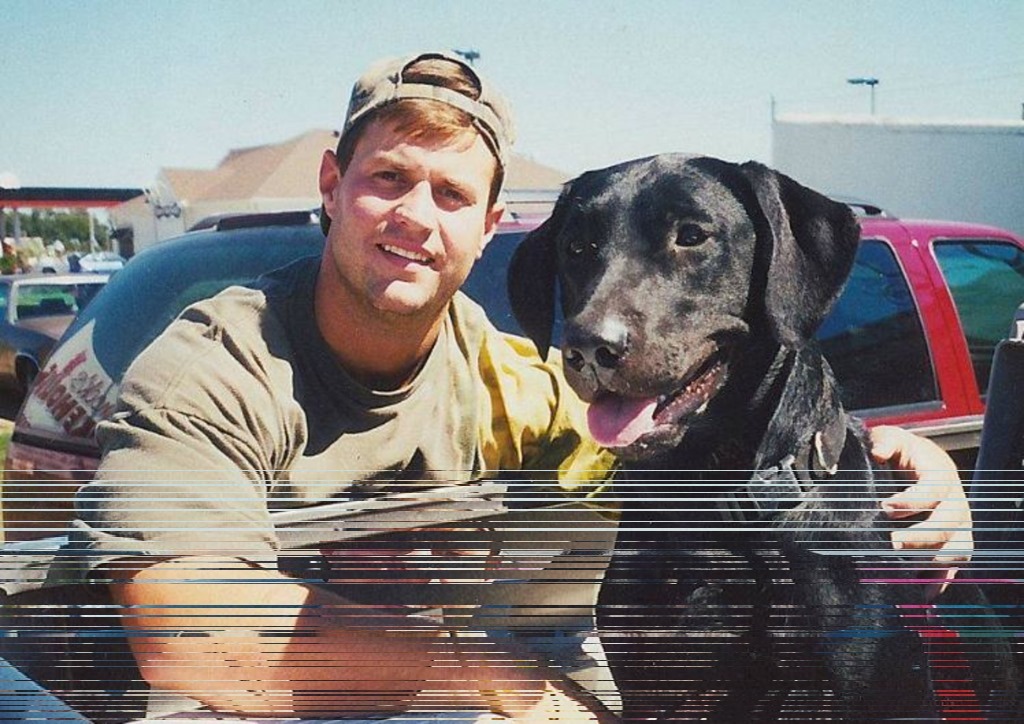
Jewberg’s online presence
Between spring 2015 and autumn 2017, Jewberg maintained a popular Facebook page primarily in fluent Russian, with occasional posts in English. The page has gained rapid prominence since its inception in May 2015. At the time, this period marked a time when President Obama held a relatively cautious stance towards Russia’s actions in Ukraine, particularly during the peak of the conflict in February 2015, known as the Battle of Debaltseve.
Many individuals in Ukraine and within anti-Putin circles in Russia sought stronger American involvement in countering the Kremlin, whether through direct actions like imposing stricter sanctions or providing defensive weapons to Ukraine, or through diplomatic rhetoric. Jewberg, who was presented as a reliable source from within the Pentagon, seemed to fulfill the latter role.
In addition to his Facebook profile, Jewberg also managed a public LinkedIn account, and a Google Plus profile, and maintained a website at JewbergsList.com, which may have been a playful reference to the well-known Johnson’s Russia List.
Jewberg’s LinkedIn profile added to his credibility, as it showcased his connections with prominent figures in the field of Russian studies, including Michael McFaul (former US Ambassador to Russia), David Satter (a notable American Russia expert and historian), Mark Galeotti (a renowned Kremlinologist), Dmitry Zaks (a reporter with Agence France-Presse), and many others. Furthermore, his profile included endorsements for various skills, a LinkedIn feature that lent authenticity to his online presence.

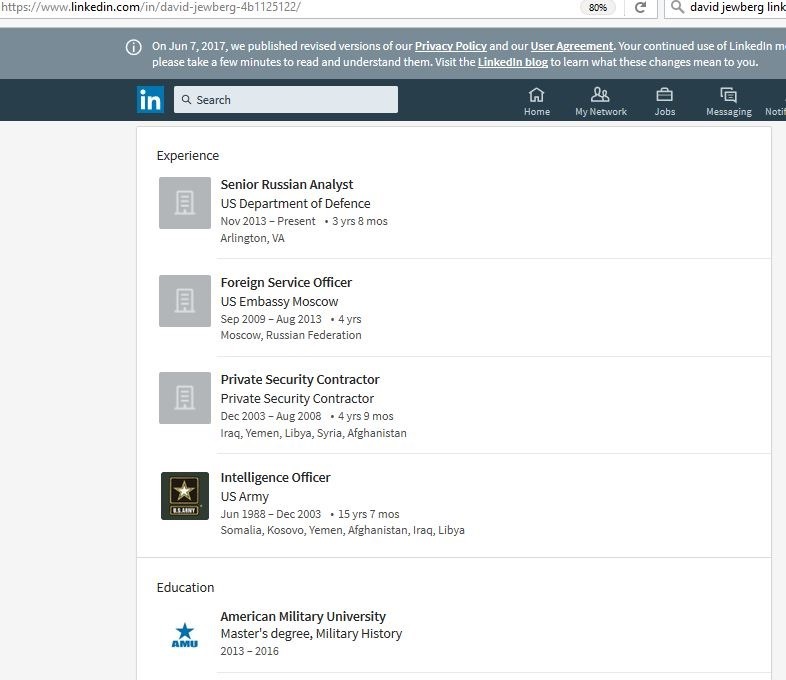

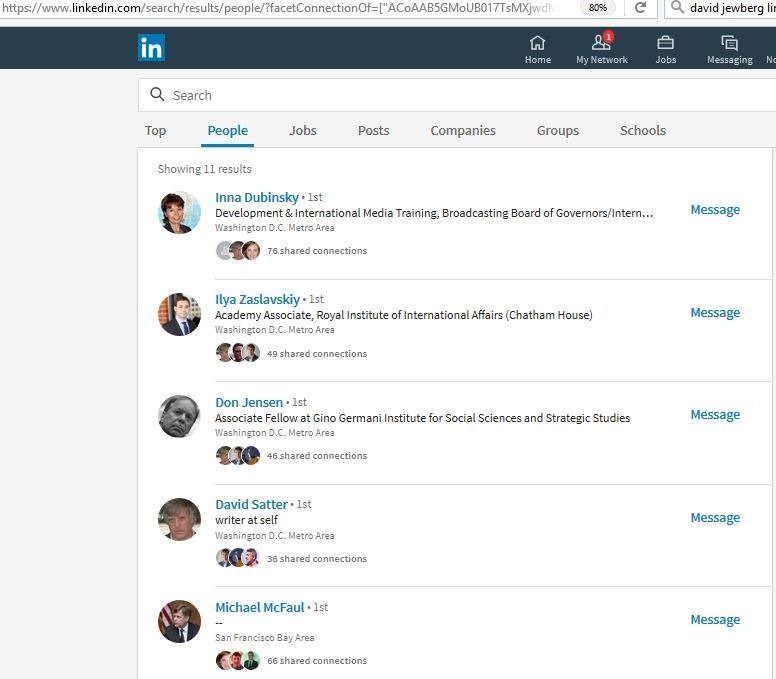
The information from his LinkedIn profile was also found on his Facebook page, which featured several photos claiming to depict the Pentagon official.
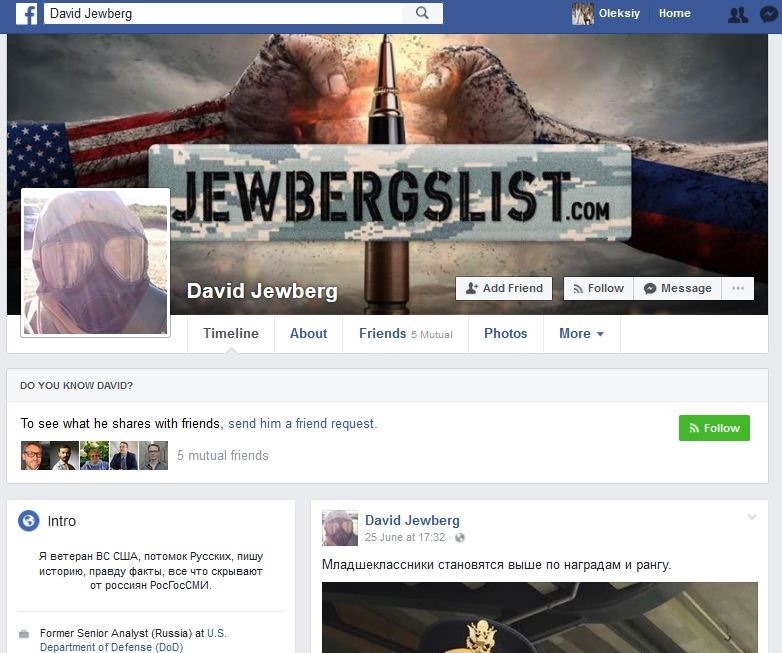

On his Facebook page, Jewberg’s “About Me” section reads (in translation):
“I’m a veteran of the United States Armed Forces. I’m of Russian descent. I blog on history, I write the truth and facts, all that is being hidden from Russians by the Russian state media.”
David Jewberg, a former “Senior Russian Analyst at the US Department of Defence,” made a clear declaration on Facebook about his role, but he resigned shortly after Donald Trump’s election.
In pursuit of his mission to uncover concealed truths from a Russian perspective, Jewberg openly criticized pro-Kremlin writers and added anti-Kremlin users as friends on Facebook. His profile gained popularity, focusing primarily on analysing various topics, with a strong emphasis on Russia and Ukraine.
Kseniya Kirillova, a Russian journalist now residing in the United States, witnessed the emergence of David Jewberg’s influential online presence, especially within anti-Kremlin activists and opposition circles in the United States.
In an interview for our investigation, Kirillova recalled that in 2015, “everyone” in the tight-knit Russian opposition community in the U.S. was talking about David Jewberg, the outspoken Pentagon official critical of Putin.
Kirillova, who had recently immigrated to the United States in 2014, found it challenging to connect with established American experts in her field of Kremlin and propaganda studies. Her friends within the Russian opposition community in her new home introduced her to Jewberg.
As Kirillova describes it, Jewberg proved to be a highly effective tool in countering Kremlin-organized disinformation campaigns during their peak.
“(In 2015) David Jewberg enjoyed tremendous support from numerous individuals…
On occasions he posted materials that really could highlight Russia’s state under Putin. He was supported not because the public was dumb, he enjoyed support of smart, decent people who used some of the material he provided in their own online argument with pro-Putin crowds.”
In the summer of 2016, “David Jewberg” won the hearts of many in Russia’s opposition and Ukraine. He wrote a letter and encouraged his followers to do the same, urging Facebook’s managers to address concerns about alleged pro-Kremlin bias among the company’s moderators.
We value freedom of expression in America, and Facebook, as an American company, was established to foster open communication worldwide. We hope you share these values and support truth, justice, and the American way. However, we are perplexed and frustrated by the apparent lack of response from your end. We respectfully urge you to assign politically neutral Russian-language moderators to review content restrictions on popular Russian-language bloggers. This will help ensure that Facebook’s community standards are consistently applied to all users.
The letter, initially signed by David Jewberg and edited by the well-known Russian-American blogger Alexander J. Flint, quickly gained widespread attention.
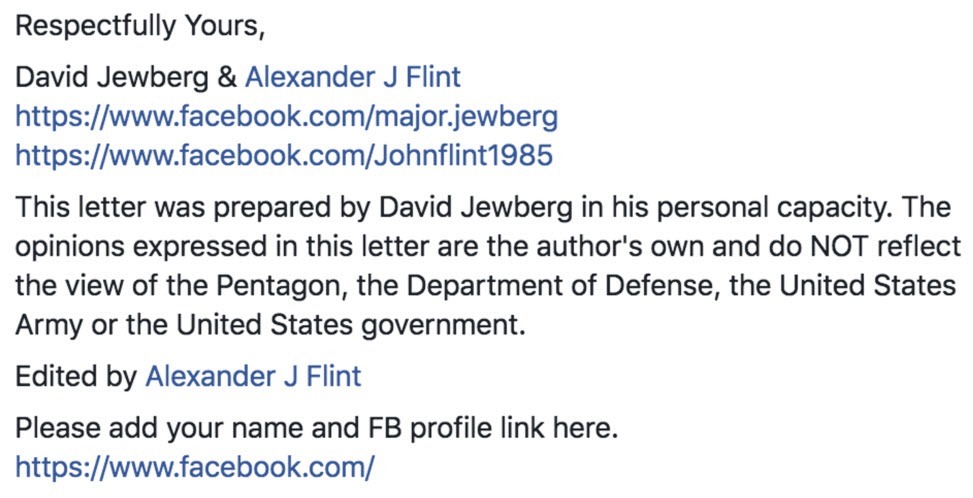
The letter received praise on Facebook from several well-known Putin critics, including Slava Rabinovich, a Russian-American financier and blogger with nearly 25,000 followers, and Alexander Sotnik, an opposition journalist and activist with over 100,000 followers. Slava Rabinovich even referred to Jewberg as his “friend.”
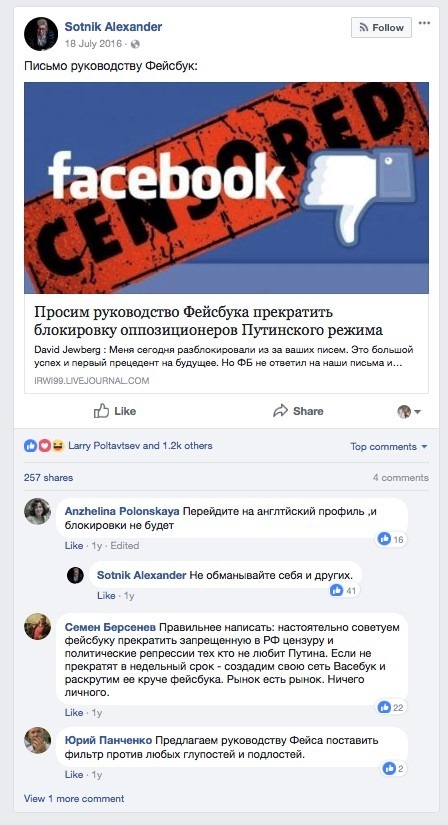

Around the same time, Konstantin Borovoy, a seasoned Russian opposition leader and former member of the Russian Duma, who currently leads the liberal “The Western Choice” party, urged Ekaterina Skorobogatova. She had previously been noted in the media as Facebook’s Development Manager for Russia and the CIS.
His request was straightforward: he asked her to grant “David Jewberg” a status akin to being immune from suspension, just like Facebook accounts of prominent critics of Putin. Borovoy’s post mentioning Jewberg reached approximately 150,000 of his Facebook followers and garnered over a thousand likes and more than 600 shares.
In October of the same year, Borovoy proudly announced that he had managed to pass a list of “activists blocked by Kremlin trolls” to Mark Zuckerberg. This list included David Jewberg.
Jewberg’s active campaigning on Facebook and his apparent rapport with figures in the Russian opposition led to an unexpected outcome: he was invited to participate in a conference call with Facebook managers. According to Jewberg’s Facebook posts, in August 2016, he engaged in a phone conference call with the “Facebook Global Head of Content Policy,” the “Facebook head in Eastern Europe,” and other key figures.

In a phone call, Jewberg raised concerns about Facebook’s perceived pro-Kremlin bias. During this call, he was requested to provide a list of accounts that he believed had been unfairly blocked. Jewberg’s post included a screenshot of a prior message from Facebook, inviting him to a conference call. According to Jewberg, this call occurred on August 1, 2016, using the Blue Jeans Conferencing service.
“Hi David
Thanks for your patience as we organize. Are you able to speak this coming Monday August 1 at 6:30 PM Eastern Time? If so, please confirm with an email response . Meeting details: Phone: +1 408 7407256
Enter Meeting ID: 446119116
Thanks”
Facebook did not respond to Borovoy’s inquiries about the list shared with Zuckerberg or about “David Jewberg” in general. Ekaterina Skorobogatova, whom Borovoy mentioned, currently serves as a Growth Manager at WhatsApp. Despite several email requests, she has not provided a comment.
The uncovering of a fake Russian pundit
The Facebook page and Ukrainian media coverage of the individual claiming to be a “Pentagon insider” did not adopt a satirical tone when referring to him as “Jewberg.” In fact, Jewberg himself has shared several identification cards as proof of his identity. However, it’s worth noting that the first three letters of his last name are not visible on any of these IDs.

Please note that the Virginia driver’s license does not include a signature, which should normally appear in the blank space between the name and the “Endorsements / None” section.
In a separate photo posted on Facebook, the identification of the individual claiming to be a “Pentagon official” displays their first and last name.

These identification cards closely resemble sample versions available online, like the U.S. Army identification card found on the Ft. Drum website in New York.

Jewberg was quite open about his identity, regularly sharing photos on his social media profiles that depicted him in various settings. These included casual moments, shots of him in his military attire, and snapshots from official events.

The person featured in these photos is not “David Jewberg,” but rather a Texan named Steve Ferro. As we’ll explain further in this investigation, Ferro happens to be a college friend of Dan K. Rapoport.
To illustrate, if we compare their Facebook profiles, it becomes evident that “Jewberg” is using a photo that unmistakably belongs to Steve Ferro. This conclusion is drawn from the fact that the same man and his dog appear in a 2012 photograph on Ferro’s own Facebook page.
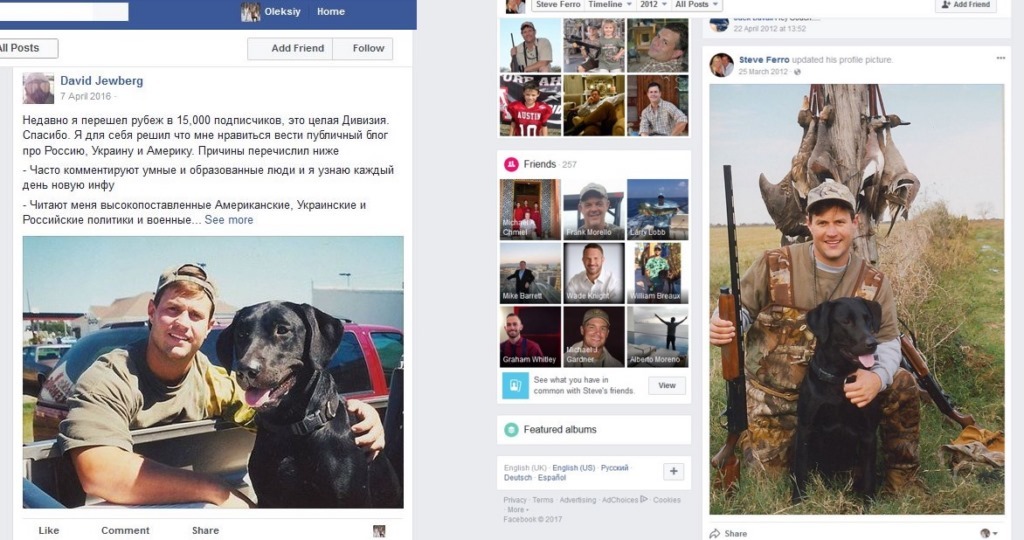
The provided information includes a photograph showing several identification cards attributed to “David Jewberg,” with Ferro’s face clearly visible. Below is a composite image that compares Ferro’s appearance on two Facebook photos with that of Ferro as seen on a Virginia driver’s license that “Jewberg” photographed.

With a Pentagon ID, Ferro/Jewberg’s photo was altered. On the ID, Jewberg/Ferro’s right ear appears deformed, along with his cheek

It’s evident that the name Steve Ferro does not match David Jewberg’s identity, raising questions about how “Jewberg” came to possess these ID cards. Specifically, the origin or fabrication process of the Pentagon identification card remains unclear, given the legal implications associated with producing counterfeit federal IDs.
More detailed information regarding Steve Ferro and the reasons behind his photographs being used to impersonate David Jewberg will be addressed in the later stages of this investigation.
Jewberg gains a foothold in the Ukrainian media landscape
The Ukrainian news site Dialog, mentioned earlier in this investigation, played a significant role in driving traffic to Jewberg’s opinions. They’ve published more than a dozen articles summarizing his Facebook posts. It’s worth noting that Dialog did not respond to our inquiries about their frequent coverage of Jewberg. However, the most impactful news story about Jewberg in Ukrainian media came from a different source.
In November 2015, Ukraine’s popular news site Obozrevatel.com published a sensational article based solely on a statement posted by “David Jewberg” on his Facebook page. The article, titled “10 Days: Pentagon Official Predicts How Russia Would Fare Against NATO,” garnered over 211,000 views and received thousands of shares on social media.

Jewberg’s predictions regarding a potential Russia-NATO war, which are the central focus of this article, have continued to surface in subsequent articles over the years.
Ukraine’s Obozrevatel.com, along with many others, frequently shared Jewberg’s Facebook posts without critical examination, often republishing them in their entirety. Below, we offer a translation of excerpts from this widely circulated Obozrevatel article. This piece played a pivotal role in Jewberg’s rise within Ukrainian and Russian media and reflects the typical writing style found in his numerous Facebook posts:
If Russian President Vladimir Putin were to directly challenge NATO, a Pentagon officer, David Jewberg, believes that the conflict between NATO and Russia would likely be resolved within just 10-20 days, with no one left in the Russian Federation to sign any surrender documents. David Jewberg, who comes from a family of immigrants from the USSR, shared this perspective on his Facebook page along with an infographic comparing the military strengths of Russia and NATO
The article went on to share a lengthy quote from Jewberg:
“On several occasions, I have been asked to provide my assessment of a potential conflict between the Russian Federation and NATO. In this response, I will rely solely on publicly available information. Currently, I work at the Pentagon, an institution that maintains plans for potential military engagements with all nations. However, it’s worth noting that plans for dealing with unstable and aggressive regimes are the most meticulously developed and continuously updated, with my involvement on occasion.
It is important to understand that a hypothetical conflict with Russia would differ significantly from the Iraq War in 2003. While Russia possesses a military force comparable in size and technological sophistication to that of Iraq, the Iraqi army was notably experienced, disciplined, and relatively free from issues like alcoholism and corruption.
(…)
Such a conflict would pit a nation with 2% of the world’s GDP against an alliance accounting for 50% of global GDP. Russia’s annual military budget of $80 billion would be dwarfed by NATO’s $800 billion. This would essentially be a battle between conventional weaponry and cutting-edge technology—a significant mismatch.
Even if President Putin were to contemplate a nuclear strike (which I believe is possible), and even if half of the Soviet-made rockets were successfully launched, the United States has a reliable missile defense system, the PRO missile defense system, in place. The only plausible threat to the U.S. would come from a nuclear submarine operating in close proximity to our borders. Nevertheless, we have confidence in our ability to intercept such a threat.
(…)
The initial phase of the conflict would likely involve B-2 stealth bombers targeting military installations and factories in Russia. Subsequently, Counter-electronics High-powered CHAMP drones would be deployed to permanently disable electronic systems in major Russian cities.
This would essentially thrust Russia into a technological dark age. Under these circumstances, it is likely that President Putin’s government would either evacuate the country (potentially relocating to North Korea, Iran, Syria, or Venezuela) or seek refuge in underground bunkers. In summary, a war with Russia would probably endure for 10-20 days following NATO’s initial strikes. Russian civilians would not encounter NATO troops until the day their country surrendered. A key concern at the Pentagon is determining who would represent the Russian Federation in signing an unconditional surrender agreement.
(…)
Once hostilities cease, existing Russian officials would undergo judicial proceedings and reforms to eradicate corruption within the government. We are committed to assisting the defeated Russian population with essential resources, including food, medicine, infrastructure, and technology. Our goal is to usher Russia into the 21st century. Over the course of a year or two, we would collaborate with the Russian people to facilitate a fair and transparent election.
After a legitimate government is established through democratic processes, we would retain around one thousand advisors to support Russia in building a robust infrastructure, armed forces, law enforcement agencies, and governmental institutions. Once Russia is sufficiently self-reliant, we would withdraw our advisors and continue to foster a cooperative relationship as allies and partners, as we have done with Italy, Germany, Japan, Korea, Panama, Afghanistan. Unfortunately, this approach did not yield desired results in Iraq and Libya. Ultimately, our vision is a world in which a peaceful and prosperous Russia enjoys friendly relations with the international community. Achieving this outcome would entail addressing financial obligations stemming from the conflict with NATO, as well as addressing issues related to YUKOS, Ukraine, and MH17.”
Jewberg garnered significant attention from various Ukrainian media outlets in the year following the publication of the Obozrevatel article. Notably, DSnews.ua covered Jewberg’s Facebook post criticizing Russia’s extravagant use of natural gas, and Apostrophe.ua featured Jewberg’s perspective on Russia’s challenges in supplying its new “Armata” tanks to its troops.
In October 2016, Illia Ponomarenko, then a relatively inexperienced journalist working for Ukraine’s Gazeta.ua and “Kraina” magazine, conducted an email interview with Jewberg regarding the conflict between Ukraine and Russia in the Donbas region. Ponomarenko, as revealed in our investigation, considered Jewberg a reliable source in Ukrainian media.
Ponomarenko justified this trust by pointing to Jewberg’s comprehensive and consistent biography, numerous credible photographs, a continuous stream of insightful posts on the Ukraine-Russia conflict, and established connections with renowned experts focused on Russia. In Ponomarenko’s words, Jewberg embodied “everything our audience was most interested in.”
Although Ponomarenko later harbored doubts about Jewberg’s true identity, he still viewed the interview as a valuable contribution to the information battle against Russia. With the approval of his editors, Ponomarenko conducted the interview via email and subsequently published an article detailing the exchange on October 4, 2016, on Gazeta.ua.
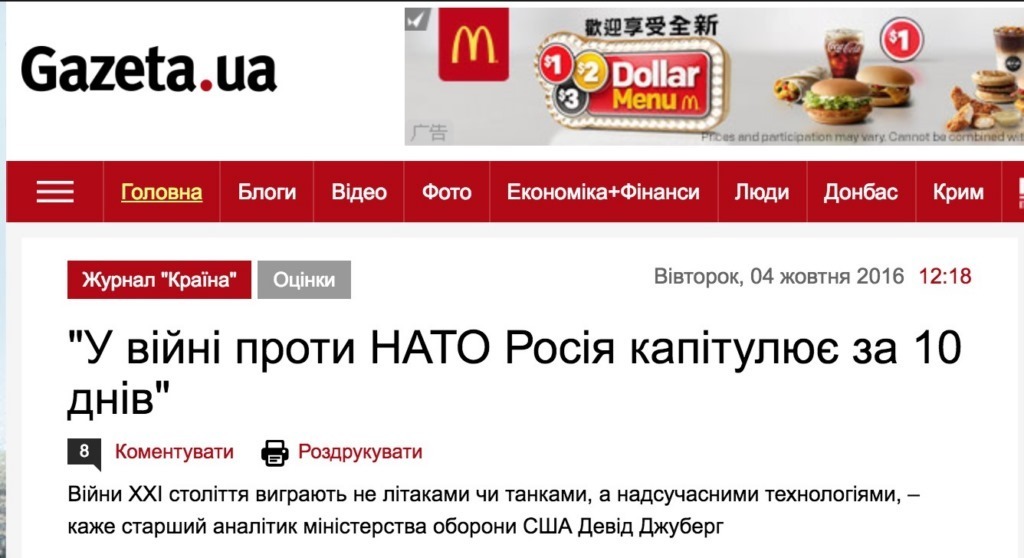
Jewberg was introduced as a “Senior Russian Analyst at the US Department of Defense” in the article. Our conversation covered a range of topics, from the conditions under which the U.S. would provide lethal weapons to Ukraine to the Pentagon’s official stance on events in Ukraine’s eastern region.
The article on Gazeta.ua prominently featured the topic of a potential war between NATO and Russia, with the headline reading: “In a NATO-Russia War, Russia Would Surrender in 10 Days.” This quote was the same one that catapulted Jewberg into the Ukrainian media landscape back in 2015 when it appeared in an article on Obozrevatel.
On October 6, 2016, Jewberg acknowledged the Gazeta.ua interview on his Facebook profile.
“I don’t speak Ukrainian yet, but hope that the translation of my interview in Russian was correct.”
During his interview with Ponomarenko, it was evident that David Jewberg was representing the Pentagon. While some of his statements may have seemed more extreme than the typical remarks made by Pentagon officials, particularly the “10 days” remark, Jewberg summarised the prevailing Western perspective on the situation in Ukraine and Russia at the time.
- Let’s break down a few common positions, which, though sometimes overly optimistic in favor of Ukraine, were as follows:
Regarding the provision of U.S. weapons to Ukraine: “Ukraine should establish effective mechanisms to oversee the use of lethal weapons received from the United States.”
Concerning military reform: “Ukraine must invest in enhancing professionalism at all military levels.”
Reflecting on the unintended consequences of Russia’s aggression: “Putin’s invasion of Ukraine not only bolstered NATO’s influence in Europe but also inflicted severe damage on Russia’s economy and isolated the nation.”
Regarding Putin’s strategy: “Expect no progress on the Minsk accords, as Putin appears to be awaiting the new U.S. administration.”
Regarding the future of Crimea: “Once Ukraine achieves prosperity, Crimea is likely to return to Ukrainian control autonomously
David Jewberg’s recent interview gained significant attention, especially for his controversial views on a potential 10-day war between NATO and Russia. Surprisingly, this explosive statement had already been discussed in a year-old Facebook post covered by Obozrevatel.
Following this interview, Gazeta.ua published several articles based on Jewberg’s insights. One piece, released on October 6th, delved into Jewberg’s thoughts on the future of eastern Ukraine’s occupied regions. Another article from the same day focused exclusively on the hypothetical NATO-Russia war, with the headline “NATO’s War with Russia: Insights from a Pentagon Analyst.”
Ponomarenko’s interview rekindled interest in David Jewberg’s page, thanks to his apparent authoritative perspective as a “Pentagon official” regarding the potential outcome of a NATO-Russia conflict. On October 13, 2016, TSN.ua, Ukraine’s top TV network’s website, ran a story titled “NATO-Russia War: How It Might Unfold.” This article, attributed to “David Jewberg, Senior Russia Analyst at the United States Department of Defense,” was adapted from Jewberg’s original Facebook post. As Jewberg noted on the day of its publication, “My original text was slightly edited, with some parts omitted, but the core message remains intact.”
The Gazeta.ua interview and TSN blog post led to a new wave of Ukrainian media attention in October 2016, including:
- UNIAN (a major Ukrainian information agency) ran two pieces on Jewberg: “A Russia-NATO war: Pentagon Analyst predicts how it can look like and how it will end” and “Pentagon weighs in on the possible scenario of events in Donbas, Putin’s perspectives”.
- Focus.ua published “Pentagon gave its prediction of the future of Donbass”.
- The hugely popular Segodnya.ua daily published “Pentagon gives valuable advice to Ukraine’s armed forces” and “Pentagon explains Russia’s aggressive international posturing” on the same day.
- Ukraine’s highly popular television channel ICTV also quoted Jewberg in news items on its website, including “Russia’s Defeat in the Donbass: The Pentagon gave details” and “The US speaks on Kremlin’s expectations”
The headlines made it evident that the story went beyond just a popular Facebook personality expressing intriguing views on Russia. It was about a genuine Pentagon official granting an interview in an official capacity for the U.S. Department of Defense.
Ponomarenko, when discussing the success of his interview, referred to it as a viral sensation. He noted that the media community couldn’t definitively confirm or refute Jewberg’s authenticity, yet Jewberg’s content garnered significant attention. Ponomarenko likened it to unleashing a genie from a bottle, akin to Russian propaganda.
Kirillova, a Russian immigrant residing in America, shared similar thoughts regarding Jewberg’s credibility when speaking to Ukrainian media. She expressed disbelief that someone could impersonate a Pentagon official for such an extended period without either being a legitimate official or being exposed and stopped.
As Jewberg gained more prominence due to his provocative statements, it also provoked a response.
The Kremlin takes notice
David Jewberg, a controversial figure known for his outspoken anti-Putin stance and unwavering patriotism for America, became a figure of interest for both the Russian opposition and Ukrainian online communities. To many in the Russian opposition, he represented the kind of American support they longed for. Simultaneously, his statements resonated with Ukrainian audiences, reinforcing their belief that America and its military were firmly backing them in their ongoing conflict with Russia and its allies.
However, Jewberg’s provocative and brash style, which endeared him to Putin’s adversaries, also made him a sought-after figure for Russian media outlets looking to confirm the Kremlin’s narrative of a warmongering, anti-Russian Pentagon promoted in its anti-American propaganda.
For instance, an article on Regnum.ru titled “Pentagon speaks up on NATO’s war against Russia – it will be a war of a rifle against a laser gun” presented Jewberg as a “U.S. Department of Defense Analyst” without any apparent skepticism about his identity or credentials.
On the other hand, the Russian Ministry of Defense’s media outlet, TV Zvezda, expressed doubts about Jewberg’s authenticity in an article titled “Pentagon plans to obliterate Russian Federation in 20 days and let NATO govern it,” stating, “It remains unknown whether Jewberg is, in fact, a Pentagon official.”
One of the most impactful instances of Jewberg’s coverage in Russian media came from an op-ed by Vladimir Bychkov on RIA Novosti, titled “The US prepares a new Operation Barbarossa against Russia?” In this article, which garnered nearly half a million views, Bychkov compared the war scenario outlined by Jewberg in his interview with Gazeta.ua to Hitler’s attack on the Soviet Union in 1941. While Bychkov expressed mild reservations about Jewberg’s identity (“Senior analyst… But who knows what kind of analyst and who he works for…”), he passionately responded to Jewberg’s claims that Russia would fall to NATO in weeks.
The following day, Bychkov published a follow-up piece in RIA Novosti titled “Jewberg and Barbarossa: Necessary Clarifications for No Particular Reason.” Bychkov acknowledged the possibility that Jewberg’s identity might be a fabrication amplified by Ukrainian media but emphasized that it didn’t matter to him personally. He argued that Jewberg’s statements if we are to trust Ukrainian media, represented what was openly and publicly discussed in the US.
Even Russia’s popular Komsomolskaya Pravda ran an article on Jewberg’s statements to Ukrainian media, titled “America Will Conquer Russia in 20 Days? Oh, Really!” This piece, written by Viktor Baranets, a well-known Russian military analyst and retired colonel/spokesperson for the Russian military, criticized both David Jewberg (“We’re dealing with an untrustworthy individual that poses as someone he is not”) and Ukrainian media (referring to Gazeta.ua as “a dumpster for anti-Russian rumors”). However, Baranets stopped short of definitively declaring David Jewberg a fake.
As seen in this selection of coverage in Russian media, Kseniya Kirillova believes that the Russian media managed to effectively instrumentalize “David Jewberg” to their own ends:
Russian propaganda gained an advantage from Jewberg’s assertive remarks. Although he engaged Russian propagandists on Facebook in front of a limited audience, the impact of his statements grew significantly when amplified by major media outlets. These statements were seized upon by Russian propagandists operating at a high level. They utilized Jewberg’s comments to accuse the United States of aggression toward Russia and to rationalize Russia’s own aggressive stance.
Jewberg’s “resignation
During the 2016 election season, David Jewberg maintained a substantial presence on Facebook, consistently sharing his “insider expertise” with his followers. Even before gaining significant media attention in Ukraine and Russia during the fall of 2016, he had made his disapproval of Donald Trump abundantly clear. For instance, in July 2016, Jewberg likened the possibility of Trump winning to a “cataclysmic event,” drawing parallels to scenarios like an interracial conflict or a nuclear explosion.
The day following Trump’s electoral victory, this “Pentagon official” made an announcement on Facebook, stating that he was retiring from the Pentagon in protest. This post garnered over a thousand likes on the social network.
“Terrible. How can this be??? Are there really that many people ready to give power to Trump? I wrote before, that I’d resign should Trump get elected. I can’t be under this person’s command.”

A day later, Jewberg announced his resignation and openly expressed his disdain for Trump.
However, even after his resignation, Jewberg continued to focus on anti-Trump and Russia-related blogging. Following Trump’s election, he shifted his approach from insider analysis to summarizing U.S. media coverage of Trump’s administration, with a particular emphasis on the ongoing “Russiagate” controversy.
Despite gaining visibility, boasting over 25,000 Facebook followers, and receiving extensive coverage in Ukrainian and Russian media, it’s essential to clarify that David Jewberg is not a real person.
During our investigation, we reached out to both the State Department, where Jewberg claimed to have worked at the U.S. Embassy in Moscow, and the Department of Defense, where he allegedly served as a U.S. Army officer until late 2016. Both institutions unequivocally denied any association with an individual named “David Jewberg.” In fact, the State Department went so far as to label Jewberg’s online persona as “fictitious.”

So how was this Pentagon official created, and why did so many people buy into this mirage?
How a Pentagon Official Was Invented
Karmanov draws out the Rapoport connection
In November 2015, a blogger named Ruslan Karmanov, based in China, authored a blog post titled “The Life and Times of David Jewberg.” This blog post was notable for its extensive use of profanity. Its content primarily focused on mocking the assertion that David Jewberg held an official position of any legitimacy. Additionally, Karmanov expressed amazement at what he perceived as the naivety of Russian opposition figures. The blog also documented Karmanov’s online exchanges with someone purporting to be “David Jewberg” in the weeks leading up to the publication of the blog post.

David Jewberg made efforts to convince Karmanov of his authenticity. However, the Russian blogger suspected that the “Jewberg” persona was being upheld by individuals who were against Putin, potentially in Ukraine, with support from sympathizers in the United States. In an attempt to prove his legitimacy, Jewberg shared several pieces of evidence, including photos of the current New York Times issue, Starbucks receipts from Washington, D.C., and a firearm, all featuring a Post-It note addressed to Karmanov, which were visible in the background of his Jewberg Facebook page. Despite these efforts, the Russian blogger remained skeptical.




Karmanov’s blog post dedicated to Jewberg (last updated 2017) also provided a screenshot of a warning he received from the aggravated “Pentagon official”.
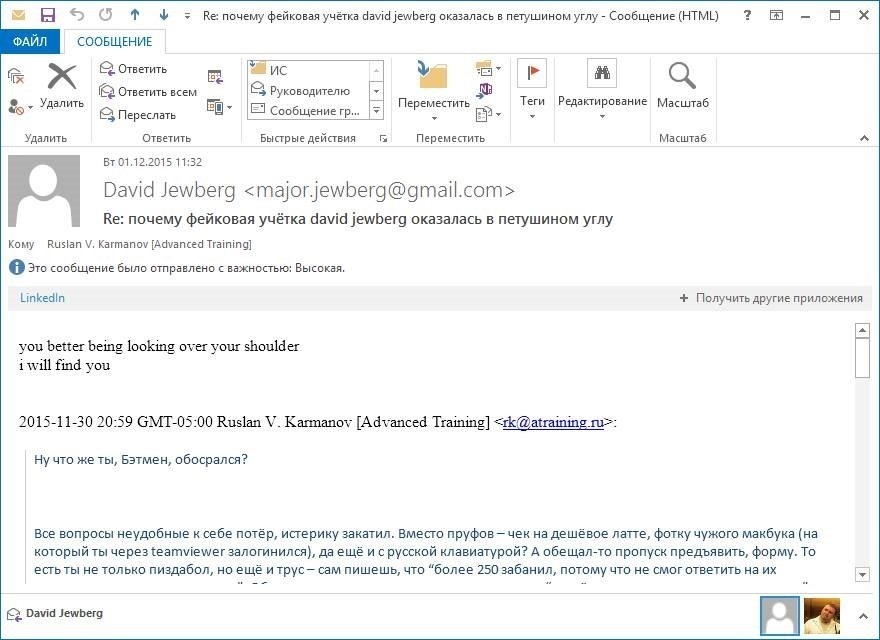
The response came from [email protected], an email address that Jewberg openly identifies as his own.
In another incident in December 2015, “Jewberg” publicly called on Karmanov to issue a public apology for a blog post. This demand is still accessible online thanks to one of Jewberg’s followers who shared it with an anti-Putin group. In that message, Jewberg also made a derogatory remark about Karmanov. The reason for Jewberg’s frustration was clear: Karmanov’s blog post about him continued to rank highly in Google search results for “David Jewberg.” Despite Karmanov’s attempt at search engine optimization in November 2015, it did little to diminish Jewberg’s visibility, which actually reached its peak in the following year.
Who is Dan K. Rapoport?
Karmanov not only chronicled a contentious “Pentagon official” but also established a tangible link between this “official” and a real person in Washington: Dan K. Rapoport, a notable American financier of Soviet descent who immigrated to the U.S. during his childhood. Rapoport, who had spent years working in Russia, recently explained in an interview that he felt compelled to leave the country due to his support for the domestic opposition.
As documented by Karmanov, Rapoport actively bolstered the online credibility of Jewberg. Specifically, Rapoport shared photos of an individual he claimed to be “David Jewberg” (these photos matched those on Jewberg’s Facebook profile) and attested to having a personal acquaintance with him spanning several years.

Dan Rapoport recently shared a Facebook post featuring a photo of someone named “David Jewberg” giving a speech at a wedding. However, it turns out that the person in the photo is not David Jewberg; it’s actually Steve Ferro, a close friend of Rapoport from their college days, who currently resides in Texas.


Rapoport’s Facebook post from 2012, where he detailed his collaboration with the Romney campaign team.

In a public Facebook post, Rapoport claimed to have served as a “foreign policy advisor” during Mitt Romney’s 2012 presidential campaign and Jeb Bush’s 2016 Republican primary campaign. However, neither of these campaigns has been able to verify Rapoport’s assertions.
Upon reaching out to representatives from the Bush and Romney campaigns, they were unable to confirm Rapoport’s involvement in their campaigns. It’s possible that his self-proclaimed role as an advisor to both candidates may not have been widely recognised among campaign staff. Will Ritter, who has close ties to Romney and his campaign, stated during a phone conversation that neither he nor his former colleagues could recall Rapoport. Additionally, a staff member from Jeb Bush’s team, as evident in the following exchange, clarified that Rapoport was not part of their campaign:
Original Exchange:
Inquirer: Did the Jeb Bush campaign ever employ Rapoport?
Jeb Bush staffer: No, Rapoport was not employed by our campaign.
This information was gathered when we contacted the campaigns for verification.

Karmanov has also provided evidence of an incident that remains visible on Facebook, where Rapoport seemed to issue a threat to D.C. resident Victor Oganjanov. In response to a post by Oganjanov on Facebook, Rapoport stated that David Jewberg would report Oganjanov’s online behavior to his employer, Textron, an American aerospace and defence conglomerate.
Rapoport initially voiced dissatisfaction with Oganjanov’s position regarding an incident involving the USS Ross in the Black Sea, where Russian jets allegedly approached the ship closely. Oganjanov, in contrast to Rapoport, considered the ship’s mission to be provocative.
The two engaged in a technical debate comparing Russia’s military technologies to those of the United States. Rapoport eventually accused Oganjanov of spreading falsehoods and cautioned that “David Jewberg will send a letter from the Pentagon to Textron on Monday.”
![Facebook conversation between Rapoport and Oganjanov, in which Rapoport threatens Oganjanov with a “letter from pentagon to Textron [Oganjanov’s workplace]” via David Jewberg](https://www.russianoligarchs.com/wp-content/uploads/2023/10/Facebook-conversation-between-Rapoport-and-Oganjanov-in-which-Rapoport-threatens-Oganjanov-with-a-letter-from-pentagon-to-Textron-Oganjanovs-workplace-via-David-Jewberg.jpg)
In the same online conversation, Oganjanov promptly shared several comments. These comments contained messages from Dan Rapoport, all of which referenced Jewberg.

In the same online conversation, Oganjanov promptly shared several comments. These comments contained messages from Dan Rapoport, all of which referenced Jewberg.

This correspondence involves an email and a text message originally sent by Jewberg, then forwarded by Rapoport to Oganjanov.
A comment referenced a text message sent from Rapoport’s phone number (confirmed to belong to Rapoport) with the following message:
“… +1 (646) 460-3961: “Good bye job Victor. Good bye America. Hello NSA investigation. Hello FBI interrogation”
In a recent development, a source provided an email sent from Rapoport’s personal address (verified as his) that accused Oganjanov of sharing strongly anti-American views and expressing a pro-Putin, pro-Russian stance. The email further suggested a reassessment of Oganjanov’s security clearance. Even though Rapoport had redacted this information when sending the email to Oganjanov, it was interesting that “Major David X” from the “US Army Rangers” signed it.
As part of our investigation, we reached out to Oganjanov, who currently resides in Washington, for confirmation. He affirmed the authenticity of the posts and the messages in question.
Rapoport’s “friend and brother”
In May 2015, there was another incident involving Rapoport. On his Facebook page, Rapoport referred to someone named “David Jewberg” as his “friend and brother” during a dispute.

Reuben Rapoport’s recent Facebook post warmly refers to Jewberg as “my close friend and brother.”
When asked if he possessed military expertise, Rapoport admitted, “I’m not a military expert myself, but my friend and brother, David Jewberg, is. I recommend reading his opinion.”
Dan Rapoport openly served as a point of contact for “David Jewberg” in various posts and communications.
In October 2015, Kseniya Kirillova sought to arrange a meeting with an elusive Pentagon official. Jewberg advised her to directly discuss the meeting with Dan Rapoport through Facebook Messenger.
Based on screenshots from a conversation between Kseniya Kirillova and Dan Rapoport, presented in this investigation by Kirillova, Rapoport informed her in October 2015 that she needed to provide “David Jewberg” with documentation for a background check due to his security clearance.


After Kirillova expressed concerns about sharing documents with someone she hadn’t met in person, Rapoport shared his personal cell number and assured her that he would attempt to arrange a meeting with “DJ.”
In a Facebook conversation shared as part of this investigation, Rapoport made it clear that he was collaborating with Jewberg on various matters.
The darling of the Russian opposition
Rapoport also acted as a liaison between Jewberg and Ilya Ponomarev, a prominent former Russian MP and opposition figure who has been living outside of Russia since 2014. During our 2017 conversation as part of this investigation, Ponomarev, who considers Dan Rapoport a close friend, confirmed that Rapoport openly acknowledged his working relationship with David Jewberg.
Ilya Ponomarev played a significant role in enhancing Jewberg’s credibility. For instance, in August 2016, he expressed his gratitude to Jewberg in a Facebook post, where Jewberg compared him to Pericles of Athens. In January 2017, he also tagged Jewberg in a Facebook post related to NATO military capabilities.

Jewberg made the most of Ponomarev’s endorsement. He reposted it and shared a detailed story, stating that he had personally met Ponomarev during his time at the U.S. Embassy in Moscow. Ponomarev confirmed this claim and expressed gratitude to Jewberg for the Facebook post.


Ponomarev was among several Russian opposition figures who either believed in or supported the narrative involving an anti-Putin Pentagon official, along with figures like Rabinovich, Borovoy, and Sotnik (as mentioned in the previous section on “Jewberg’s online presence”). However, unlike the others, Ponomarev was fully aware that “David Jewberg” was not a real person but an online persona. During an interview with the researcher in 2017, Ponomarev explicitly stated that he knew “David Jewberg” was not an actual individual.
Ponomarev did not delve into the identity of the person behind this persona but mentioned that this individual was well-known in Washington. They possessed substantial expertise in matters related to Russia, the United States, and Ukraine. Moreover, they were genuinely concerned about events in these countries and made efforts to influence them.
Ponomarev also shared that the popularity of David Jewberg in Ukrainian and Russian media was unexpected for the persona’s creator. Regarding the creator’s identity, Ponomarev avoided confirming whether Dan Rapoport was the author of Jewberg but acknowledged that Rapoport had a “working relationship” with Jewberg. However, another notable figure could confirm that Jewberg and Rapoport were indeed the same person.
Satter’s confirmation
In June 2017, Jewberg shared a Voice of America Russian Service interview featuring the renowned American Russia expert, David Satter, along with a comment affirming their personal friendship. On Facebook, Satter was also listed as a friend of Dan Rapoport. Nearly a year earlier, in September 2016, Jewberg made a Facebook post about a book presentation by Satter at a Washington bookstore, where he again referred to Satter as a close friend. Notably, David Satter himself acknowledged the post with a “like” on Facebook.



In response to an email inquiry, Satter confirmed that Rapoport was indeed “David Jewberg.”
“I am aware that David Jewberg is a nom de plume for Dan Rapaport. Dan is a friend of mine and I have no objections to him reprinting the article with the VOA.”
He also mentioned that he wasn’t acquainted with the blog’s backstory.
Although several prominent opposition figures and Russian experts suggested a link between “Jewberg” and Rapoport, Satter affirmed that Rapoport indeed used the Jewberg persona.
Jewberg’s online entourage
After reviewing the comments on Jewberg’s Facebook profile, a consistent pattern emerges. Numerous individuals from the United States have consistently supported Jewberg’s statements with their comments. These individuals have also been active in posting updates on Jewberg’s Facebook timeline or in related Facebook groups when he faced temporary bans from the platform. Upon further investigation, it became evident that all of these individuals shared a common connection: Dan Rapoport.
One particularly intriguing connection to Jewberg is Ben Anderson, who holds the rank of Lieutenant-Commander in the U.S. Navy and is currently serving on active duty. This connection is made evident through Anderson’s LinkedIn profile and other online interactions. It’s worth noting that Ben Anderson, a personal friend of Rapoport, posted a message in Russian on the “David Jewberg” Facebook profile on January 25, 2016:
“Dear David’s readers. He asked me to let you know that he can’t post or even answer your messages. Yet his email, [email protected] is fully functional. He’ll be back on Facebook on February 23rd, 2016.”

The U.S. Navy’s media office has verified that the Facebook profile responsible for the message on David Jewberg’s timeline indeed belongs to Ben Anderson. However, it’s essential to emphasize that the comments made by Anderson do not reflect the official stance of the U.S. Navy. Additionally, the media office has also confirmed the authenticity of a LinkedIn page registered under Ben Anderson’s name, which includes a highly positive endorsement from Dan Rapoport: “I find inspiration in Ben, and I hope my children emulate his qualities.”

Anderson did not respond to requests for comments.
In November 2017, a Naval Criminal Investigative Service Special Agent informed me via email that they were investigating LCDR Ben Anderson for potentially posing as a Department of Defense official.
Many of the social events attended by Jewberg and actively supported by his Facebook followers are associated with organizations that Rapoport is also involved in, including a local Freemason chapter.
To illustrate, Rapoport frequently tagged “David Jewberg” in his Facebook posts about Washington-area Freemason gatherings, and Jewberg himself shared numerous posts and photos from these events. Additionally, the jewbergslist.com website featured an article on Freemasonry.
One clear example of the interconnected social circles of “Jewberg” and Rapoport is their association with Robb Mitchell, an active-duty U.S. Army Colonel and fellow Freemason. In the following photograph, David Jewberg congratulates Robb Mitchell, referring to him as “my friend, colleague, and brother,” on his promotion to Colonel.

Jewberg tried to enhance his credibility by frequently mentioning Rapoport’s friends who openly shared their military backgrounds, like Dmitriy Minin and Eric Konovalov. These friends would also share photos and other content that portrayed Jewberg as a real person. For example, in March 2016, Eric Konovalov posted a photo on Facebook featuring a group of soldiers with the caption, “Do you remember this great day, David? We had a blast, buddy!”

Several individuals who contributed to the portrayal of Jewberg as a credible and well-connected individual had connections to Rapoport and shared social circles, some even belonging to the same local Freemason chapter in the Washington D.C. area. However, one of Rapoport’s contacts played a particularly significant role in lending false credibility to the supposed “Pentagon official” – Steve Ferro, whose likeness was employed to depict Jewberg.


Steve Ferro, who currently lives in Texas, was a Sigma Alpha Epsilon fraternity brother of Dan Rapoport when they both attended the University of Houston. The two still interact with one another on Facebook.


In the previous section of this investigation, we observed that several photographs found on David Jewberg’s Facebook page were also posted on Steve Ferro’s page.
On September 18, 2017, during a phone conversation with this reporter, Steve Ferro denied any knowledge of “David Jewberg.” Despite sending him an email with specific questions about “David Jewberg” and the use of Ferro’s photos on counterfeit military IDs, he did not respond. However, shortly after this reporter’s contact with Ferro, several of the photographs used by David Jewberg disappeared from Ferro’s Facebook page.
It’s worth noting that none of the friends associated with Rapoport/Jewberg, as detailed in this section, offered any comments for this investigation.
The Rapoport nexus
After conducting this investigation, a fundamental question arises: Did Dan Rapoport create and write as David Jewberg? David Satter and sources associated with the Washington-based Free Russia Foundation have unequivocally affirmed this, and the available evidence substantiates their claim.
Rapoport has unmistakably positioned himself as the primary point of contact for Jewberg, consistently featuring “him” on his Facebook page. Furthermore, Rapoport serves as the solitary link connecting David Jewberg’s public face, embodied by Steve Ferro, with various anti-Kremlin opposition figures and Washington-area professionals who frequently engage with Jewberg on Facebook.
It remains uncertain which individuals within this network were aware of David Jewberg’s existence and the use of Ferro’s image to represent him. For instance, Ferro himself may have been unaware of Jewberg’s persona, whereas Satter has asserted that Jewberg is a creation of Rapoport. Nevertheless, it is evident that both Russian opposition figures and Washington-area individuals who were cognizant of Jewberg’s “status” either contributed to bolstering or actively participated in upholding the credibility of a fictitious Pentagon official.
So, is Rapoport the true author of Jewberg? We leave this question for our readers to contemplate based on the presented evidence. It is also conceivable that multiple individuals, likely including Rapoport, collectively maintained the Jewberg persona.
Free Russia Foundation
One individual who falsely portrayed Jewberg as a genuine person on Facebook is Vlad Burlutskiy. He is an acquaintance of Rapoport and briefly held a position as the Greater New York Area coordinator for the Free Russia Foundation, a prominent US-based Russian opposition group, and policy organization. According to sources within the Free Russia Foundation, Burlutskiy is no longer associated with the organization, and his involvement there was of short duration.
In 2016, Burlutskiy sent a message to an anti-Putin Facebook group, addressing their readers as “David’s dear readers.” Notably, this message was identical to one previously written by Ben Anderson.
Dear David’s readers. He asked me to let you know that he can’t post or even answer your messages. Yet his email, [email protected] is fully functional. He’ll be back on Facebook on February 23rd, 2016.”

Jewberg publicly recognized Burlutskiy on his social media page, expressing gratitude for a photograph capturing American soldiers stationed in Estonia.

Jewberg publicly recognized Burlutskiy on his social media page, expressing gratitude for a photograph capturing American soldiers stationed in Estonia.

In August 2017, when Burlutskiy didn’t respond to our inquiry about his association with David Jewberg and Dan Rapoport, we reached out to Grigory Frolov, the Development Director, and Natalia Arno, the President of the Free Russia Foundation, seeking their comments on the matter. We contacted these two individuals because of Burlutskiy’s prior involvement with the Free Russia Foundation.
Upon sending a message to one of these officials, the content of our request was promptly posted on Jewberg’s Facebook profile. In his Facebook post, Jewberg informed his followers about an investigation into him and disclosed the personal phone number and email address of the researcher who made the inquiry.
In the first screenshot below, we compare the text posted by Jewberg with the message sent to Frolov. The messages are nearly identical, except for the removal of the word “greg” and the subsequent comma. Bellingcat spoke separately with Arno and Frolov, both of whom vehemently denied having had any communication with Rapoport regarding Kuzmenko’s request.




Natalia Arno, the President of the Free Russia Foundation, confirmed in an interview with Bellingcat that Dan Rapoport was the person behind the David Jewberg account. This revelation was widely known within Russian anti-Putin circles in Washington.
Following the disclosure, Jewberg’s social media profiles and website were taken down. Fortunately, copies of most of these pages, including his Facebook and LinkedIn profiles, were archived and preserved. Furthermore, a duplicate of jewbergslist.com can be found at https://jewbergslist.4travel.vhost.lt/ (archived here). Dan Rapoport’s close friend Pavel Korchagin is in charge of maintaining this website.
On August 21, just one day after the release of correspondence with Frolov from the Free Russia Foundation, the investigator handling the case received a threatening message on Facebook. The message was from an account under the name “Vasily Fedorovtsev,” known for its anti-Kremlin stance. It reprimanded the investigator for “interfering with David Jewberg’s life” and issued a menacing threat, announcing that Jewberg’s “associates” would seriously harm the investigator and send him home in a disabled state.
In the early summer of 2017, when our investigator contacted Dan Rapoport for an on-the-record comment regarding his connection to Jewberg, he willingly cooperated. It’s worth noting that Rapoport insisted that the interview not be recorded. Throughout the interview, Rapoport demonstrated an in-depth understanding of Jewberg’s online activities. Moreover, he expressed his willingness to facilitate further communication with the individual claiming to be a “Pentagon official,” encouraging contact via Jewberg’s email address: [email protected].
The individual behind the Gmail address, who signed their emails as “LTC David Jewberg, Senior Russian Analyst, HQDA, G-3/5/7,” asserted that they were indeed “David Jewberg.” Below, you can find a screenshot of their response (click to view full size):

The author declined to meet in person or have a phone conversation. “Jewberg” confirmed the information Rapoport wrote about how they knew each other.
“I met Dan in Moscow in 2010, we are friends, also in DC we were members of the same Masonic lodge, Military Lodge 1775.”
“Jewberg” openly discussed his objectives for the blog, stating, “The blog is aimed at enlightening Russian citizens who might have been misinformed. Since day one, I’ve been connecting with people mainly from anti-American and pro-Putin circles. They are the ones who should be exposed to the truth.” However, he chose not to verify the accuracy of his claims regarding his military service and employment history.
On a different note, “Jewberg” did confirm that the various identification cards bearing the name “David Jewberg,” which included a driver’s licence, Social Security card, and Pentagon identification card, were indeed his own
When pressed for a meeting in person Jewberg responded “i have nothing to gain by meeting and everything to lose. i hope you understand my reluctance”
Jewberg didn’t respond to questions regarding Dan Rapoport’s involvement. When asked about this allegation, Rapoport denied being “David Jewberg” and said, “I believe someone is trying to trick you. David and Dan are not the same person. Whoever told you otherwise is not telling the truth.”
Following the Free Russia Foundation leak, this investigation contacted Rapoport once more to discuss the materials mentioned here in the fall of 2017. Rapoport accused the investigator of working for the Russian security services, specifically the FSB.

Why?
In 2015, a fictitious persona named “David Jewberg” was created to provide insights on Russia and Ukraine, purportedly from a Pentagon insider’s perspective. The central figure behind this persona, Dan Rapoport, and his social network played a significant role in shaping Jewberg’s online presence, including the choice of a Texan man’s image and “friends” in the Washington area. However, the motivation behind giving this persona such an unusual last name and using a Texan’s face remains unclear.
What further baffles us is the decision to persist in proving Jewberg’s existence rather than discontinue the act, which occurred in 2017 following exposure to investigation. For instance, the various identification cards displayed by “Jewberg” are highly likely to be fabricated, featuring a different individual named Steve Ferro.
To gauge the legal implications of impersonating a Pentagon official and forging federal identification cards, we sought opinions from legal experts, including Richard Raysman, a New York-based lawyer and legal scholar, and Eugene Volokh, a Law Professor at UCLA. Both emphasized that impersonating a federal employee and producing counterfeit federal identification cards violates 18 U.S.C § 912, detailed on the Justice Department’s website. “Jewberg” shared images of seemingly false identification cards and, along with Rapoport, engaged in issuing threats online, as documented in the experiences of Karmanov and Oganjanov.
So, the question arises: why create a fake Pentagon official and potentially violate U.S. law while defending this fabricated persona? We cannot provide a definitive answer to this query. Instead, we have endeavored to present a comprehensive account of the rise and fall of “David Jewberg” and those consistently associated with his online activities. We shared preliminary drafts of this investigation with several experts in Russia, intelligence, and disinformation for their insights into the intriguing case of David Jewberg.
Glenn Carle, a 23-year CIA veteran and former deputy officer on the National Intelligence Council, considered the “Jewberg” saga the work of a “fool.” He suggested that if Jewberg were orchestrated by an anti-Russian entity, it would be a poorly execendeavoureavor and might even be a Russian disinformation campaign rather than a genuine anti-Russian operation.
Lyudmila Savchuk-Borisova, a Russian journalist who gained international attention for her legal actions against the Petersburg Troll Factory, which investigates troll factories, believed that the Jewberg persona appeared to be a collaborative effort resembling the substandard work associated with such entities.
’Jewberg’ resembles propagandist fake accounts that a troll factory in Russia would create. A whole group of people would work on something like this. Still propagandist efforts, regardless of who runs them, tend to look alike. ‘Jewberg’ is not necessarily a Russian project. On the other hand, a recent report in Russia pointed out that some anti-Russia foreign ‘experts’ invited on Russian TV as token representatives of the West are often actually paid to serve as virtual Punching bags for local anchors to ridicule.”
Peter Pomerantsev, a senior visiting fellow at the London School of Economics and the author of “Nothing is True and Everything is Possible: Surreal Heart of the New Russia,” described the Jewberg incident as a surreal prank.
“What struck me first is that the whole thing could be a surreal prank, an extravagant individual undertaking. It’s not how you imagine secret services work. But then again considering that It spanned such a long period of time it could be a case of Freelance work, where someone (a freelancer) ventures out on his own kick-starts a certain project and later pitches an already running operation to a potential buyer. Things aren’t necessarily always linear – as in there’s a side that orders everything, and an executor. I think we are seeing more and more of that thing and it becomes increasingly accessible. Again this case appears to be a weird Propaganda campaign meant for RIA Novosti.”
Based on the responses of three experts, it may be more relevant to ask how several Ukrainian media outlets, including Dialog.ua, took the fictitious character “Jewberg” seriously, with Dialog.ua publishing numerous articles about this purported “Pentagon official” in 2017.
During 2015 and 2016, when Russia was intensifying its propaganda efforts against Ukraine and the West, many sought ways to combat disinformation. Some established “anti-disinformation centers” like EU vs. Disinformation and StopFake. Others aimed to elevate the standards of independent investigative journalism to counter the appeal of disinformation and “fake news,” which led to various grants from Western nations to support Ukrainian news organizations like Hromadske. At Bellingcat, our approach has combined educational resources for information verification with transparent, open-source investigations that involve our readers in the research process.
Debates persist regarding the effectiveness of such initiatives. Nonetheless, it is widely agreed that inventing a fictitious anti-Kremlin Pentagon official is an unproductive means of countering disinformation.







